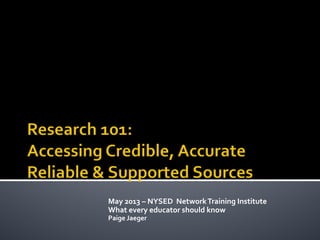Nti may 2013
- 1. May 2013 ©C NYSED NetworkTraining Institute What every educator should know Paige Jaeger
- 2. ?If your assignment can be answered on Google, then it is void of higher level thought. Hide Ī«n SeekĪŁ
- 3. ? This generation is technologically literate, ?But information illiterate.
- 7. ? Top ? Down ? Left ? Right ? Answer questions.
- 9. Ī░We ĪŁhave lost control over the information. Children control it now. They need to learn to control [it]ĪŁin positive, productive, and personally meaningful waysĪŁ.Ī▒
- 12. ? VisualThesaurus.com ? VISUwords.com ? Use tools
- 14. Ī░Average Person spends two seconds on each website.Ī▒ -Marilee Sprenger Images: fannation.com Orkin.com news.discovery.com
- 15. ? A Information ? B Sources ? C Newspapers ? D Magazines ? E Educational Videos ? F Vetted resources ? G Print-worthy material
- 16. ? Quotes Ī░red listĪ▒ ? Booleen operators ? Lincoln NOT car ? Hurricane NOT basketball
- 17. ? Essential? ? Valuable? ? Interesting? ? Trivia? Could helpCould help Should help Should help TriviaTrivia Must UseMust Use
- 18. See your LIBRARIAN for passwords to your Databases. You likely have ?NOVEL ? & more For TodayĪ»s purposes, we will use the access point: Coolibrary.com
- 19. When is it important to restrict dates? ? When is it important to use multiple words ? When might you want to limit by NOT?
- 20. Hands On Scenarios-topics: ? Pesticides - carcinogen ©C link ? Pleasure sports ? environmental insults ? Extreme sports ?regulations needed? ? Speed restrictions ? cars, safety ? Oil spills, government control, automobile emissions ? Poverty ? effects ? justice
- 23. ? Bauerlein, Mark. The Dumbest Generation: How the Digital Age Stupefies Young Americans and Jeopardizes Our Future (Or, Don't Trust Anyone Under 30). New York: Tarcher, 2008. ? Coley , David . "Leading Generation Y ." Principal Leadership, February 2009, 24-28. ? Denham, Thomas J., and Nancy adbow. "Literature Review: Factors Affecting the Development of Generation X and Millennials. Societal Factors Affecting Education." 2002. ERIC, EBSCOhost (accessed December 12, 2009). ? Gardner, Susan, and Susanna Eng. "What Students Want: Generation Y and the Changing Function of the Academic Library." Portal: Libraries and the Academy 5, no. 3 (July 1, 2005): 405-420. ERIC, EBSCOhost (accessed December 12, 2009). ? Goldgehn , Leslie A. . "Generation Who, what, Y? What you need to know about generation Y." International Journal of Education Advancement, April 2004, 24-34. http://ezproxy.strose.edu:2062/ehost/resultsadvanced?vid=3&hid=105&sid=85ad7567-2dee-48f5- 8db4-112c032dd684%40sessionmgr114&bquery=(generation+who%2c+what %2c+What+you+need+to+know+about+generation+Y) (accessed November 29, 2009). ? Loertscher , David . "What works with the Google Generation ." Teacher-Librarian, April 2008, 42. ? Marklein, Mary Beth, and USA TODAY. "How to make NSSE college scores work for you - USATODAY.com." News, Travel, Weather, Entertainment, Sports, Technology, U.S. & World - USATODAY.com. http://www.usatoday.com/news/education/nsse.htm (accessed December 12, 2009). ? Indiana University Center for Postsecondary Research. "NSSE: National Survey of Student Engagement." NSSE: National Survey of Student Engagement. http://nsse.iub.edu/index.cfm (accessed December 12, 2009). ? Oblinger, Diana. "Boomers, Gen-Xers, and Millennials: Understanding the "New Students.." EDUCAUSE Review 38, no. 4 (July 1, 2003): 36-40,42,44-45. ERIC, EBSCOhost (accessed December 12, 2009). ? Palfrey, John. Born Digital: Understanding the First Generation of Digital Natives. New York: Basic Books, 2008. ? Prensky, Marc. "Engage Me or Enrage Me": What Today's Learners Demand." EDUCAUSE Review 40, no. 5 (September 1, 2005): 60,62,64. ERIC, EBSCOhost (accessed December 12, 2009). ? Reeves , Thomas . "How do you know they are learning? ." Int. J Learning Technology Vol 2, no. 4 (2006): 294-309. Eric (accessed December 5, 2009). ? Small, Gary, and Gigi Vorgan. iBrain: Surviving the Technological Alteration of the Modern Mind. New York: Collins Living, 2008. ? formatting by BibMe.org.









![Ī░We ĪŁhave lost control over the
information. Children control it
now. They need to learn to control
[it]ĪŁin positive, productive, and
personally meaningful waysĪŁ.Ī▒](https://image.slidesharecdn.com/ntimay2013-130515221953-phpapp01/85/Nti-may-2013-9-320.jpg)













